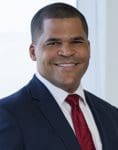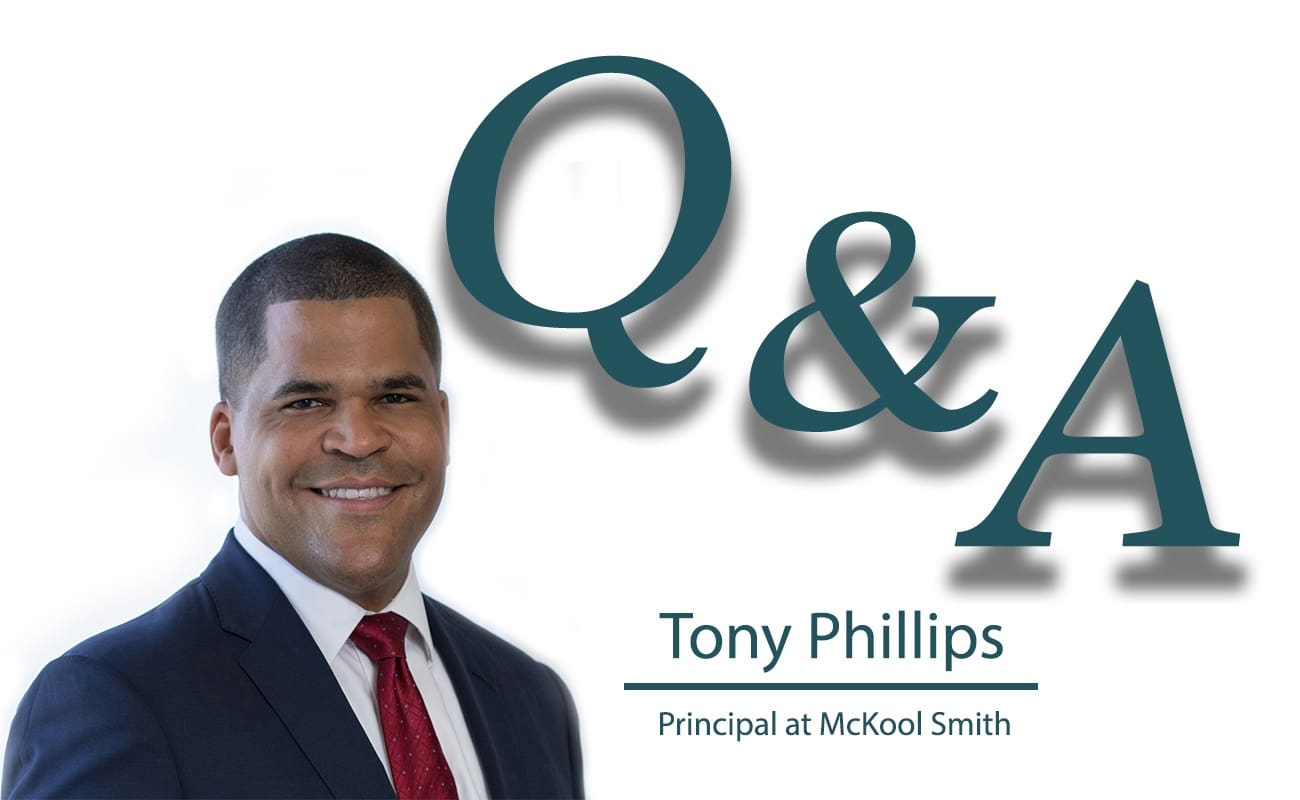Q&A with Tony Phillips, Principal at McKool Smith
Today we share an interview between CCI’s Publisher, Maurice Gilbert, and Tony Phillips, Principal at nationally recognized trial firm McKool Smith. Tony, who recently joined the firm, previously served as Senior Legal Officer for Corporate Ethics and Compliance at MD Anderson Cancer Center and as a trial attorney for the DOJ, where his courtroom achievements in a high-profile police corruption case resulted in a commendation from former FBI Director Robert Mueller.
Maurice Gilbert: How did you get started on a career in compliance, white collar defense and investigations?
Tony Phillips: I began my career in the U.S. Air Force, having volunteered after the 9/11 terrorist attacks, and served as a military lawyer — a “JAG.” In the Air Force, new JAGs are trained as legal generalists. In my first two years of service, I had the opportunity to learn and practice in just about every area of law that impacts a typical Air Force base: civil law, administrative law, international and operational law and military justice. I gravitated toward military justice in particular, which is where I first developed my passion for and experience with investigations, jury trials and criminal law.
My first civilian job after the Air Force was with Covington & Burling, LLP in Washington, D.C.
I enjoy compliance and investigations work in particular, because it gives me the opportunity to “protect” clients, rather than merely “defend” them. My work also allows clients to stay focused on executing their business goals and worry less about internal problems. I enjoy being that “ounce of prevention” that avoids the costs in time and resources often required to cure.
MG: What informed your decision to join McKool Smith, and how are you hoping to build on the firm’s expertise in compliance matters?
TP: I was immediately attracted to McKool Smith’s combination of a nationwide footprint and considerable resources with a nimble and aggressive, client-focused mentality. With nearly 200 trial lawyers at the firm, we have a breadth of experience across issues and industries that serves as a safety net for clients when the unexpected arises, which is precisely the moment clients turn to outside counsel. And, importantly, when a major allegation comes in or it becomes necessary to jump into an investigation with both feet, we have talented lawyers available from coast to coast who can spring into action for clients. McKool truly operates as “one firm,” and that inter-office cooperation is a force multiplier when the stakes are highest.
MG: Who helped shape your views?
TP: I have worked with strong lawyers, executives and leaders in a variety of contexts: the military and civilian worlds, the public and private sectors and as both in-house and outside counsel. I have been fortunate to work in a lot of different environments, which gives me a unique perspective and set of experiences.
MG: How do you stay current on ethics and compliance issues?
TP: I find that online resources like Corporate Compliance Insights, The Society of Corporate Compliance and Ethics and other compliance-focused groups are a good source of information about developments in the field. I also find that by staying connected with friends and colleagues in the compliance field, I am tipped off about interesting developments or issues by articles they post or tag on LinkedIn or other social media. I also rely on news aggregators to pull in stories from across relevant industries, like white collar, compliance, litigation, legal ethics and the like.
MG: What types of clients do you work with, and how do you affect change within your clients’ environments?
TP: Houston clients tend to fall into our two major industry silos: energy and health care. On the energy side, I’ve represented large and mid-size exploration and production companies, oilfield services providers and directors and officers. On the health care side, I’ve represented large hospitals, nationwide health care services providers and even individual doctors. With each client, though, my goal is largely the same: to ensure that they understand the legal and regulatory expectations impacting their business or work and, where we can, to add structure to their internal prevention processes that is meaningful without being unduly disruptive.
MG: What do you see as the greatest business risks facing organizations today?
TP: IoT security and privacy are both huge issues today. We are increasingly connected, and in a way that we simply weren’t even 10 years ago. Today, cybersecurity goes beyond protecting our workplaces and office networks and extends to smartphones, home networks and the airwaves. As schemes and methods to infiltrate business IT systems become more and more sophisticated and dangerous — from phishing to ransomware — companies need to respond with tools, processes and training that are just as modern and even more capable.
MG: What do you see as the greatest regulatory risks facing organizations today?
TP: Inattention: With the reach of social media, the rise of employee reporting (and qui tam litigation) and the speed at which news and information travels, there is little tolerance for organizations that fall behind industry standards when it comes to managing legal or regulatory risk. It can be hard for companies in highly competitive and fast-moving industries to be thoughtful about their own business practices. However, admitting a failure of due diligence and promising to do better will rarely satisfy regulators or the government if preventable misconduct occurs.
MG: How does McKool Smith help its clients navigate and mitigate these risks?
TP: McKool Smith’s approach is both to stay current on industry news and regulatory changes and to share lessons internally from the litigation and business disputes we handle. One of our strengths is that we stay connected through both interpersonal communication and firm-wide updates, producing meaningful synergy through our collective experiences.
MG: How might Chief Compliance Officers, Chief Audit Officers and Chief Risk Officers prepare to face these risks? How do you see the CCO role evolving within the next three years?
TP: First, it is really important to know your client. Understanding the business you’re in — including how it may differ from the last company, city or even function you served in — is critical to identifying and managing risk appropriately. Second, the right tools can increase the reach and effectiveness of your program. Explore software tools that will help you communicate with your organization; track trainings, approvals and outcomes; and streamline investigations. Third, think outside the box. Addressing risks can be a lot like whack-a-mole, but threats to companies are ever-changing and so the enterprise risk management process has to be just as nimble and creative.
I think the role of the CCO needs always to be one of engagement. Ensuring that employees across business units understand the various threats and vulnerabilities a company faces is critical to reducing risk, and creating a culture of integrity and compliance from the top down is equally critical to protecting a company from within.
MG: Compliance departments are often asked to accomplish their work with limited resources. Do you think this is accurate, and do you see this situation changing any time soon?
TP: Most companies are looking for ways to get leaner and more efficient, and administrative teams are often asked to do more with less, especially in periods of recession or uncertainty. I don’t think that will ever change. But I also think overlooking the value of the compliance function is a big mistake. Effective compliance programs protect the company (and its resources) from both external and internal threats, and properly and professionally conducted investigations can sometimes recoup a company’s losses. Ultimately, part of a CCO’s role is to demonstrate the value of the compliance program to the business, which requires investing in prevention to avoid the costs of cure.
 Anthony J. “Tony” Phillips is a Principal in McKool Smith’s Houston and Washington, D.C. offices where he focuses on complex commercial litigation, white collar defense, and compliance matters. With as much experience persuading juries and judges as he has advising military commanders and C-suite executives, Tony is uniquely equipped to begin each matter with the end game in mind. Tony has successfully represented companies, individuals, and the federal government in high stakes legal matters.
Anthony J. “Tony” Phillips is a Principal in McKool Smith’s Houston and Washington, D.C. offices where he focuses on complex commercial litigation, white collar defense, and compliance matters. With as much experience persuading juries and judges as he has advising military commanders and C-suite executives, Tony is uniquely equipped to begin each matter with the end game in mind. Tony has successfully represented companies, individuals, and the federal government in high stakes legal matters.












